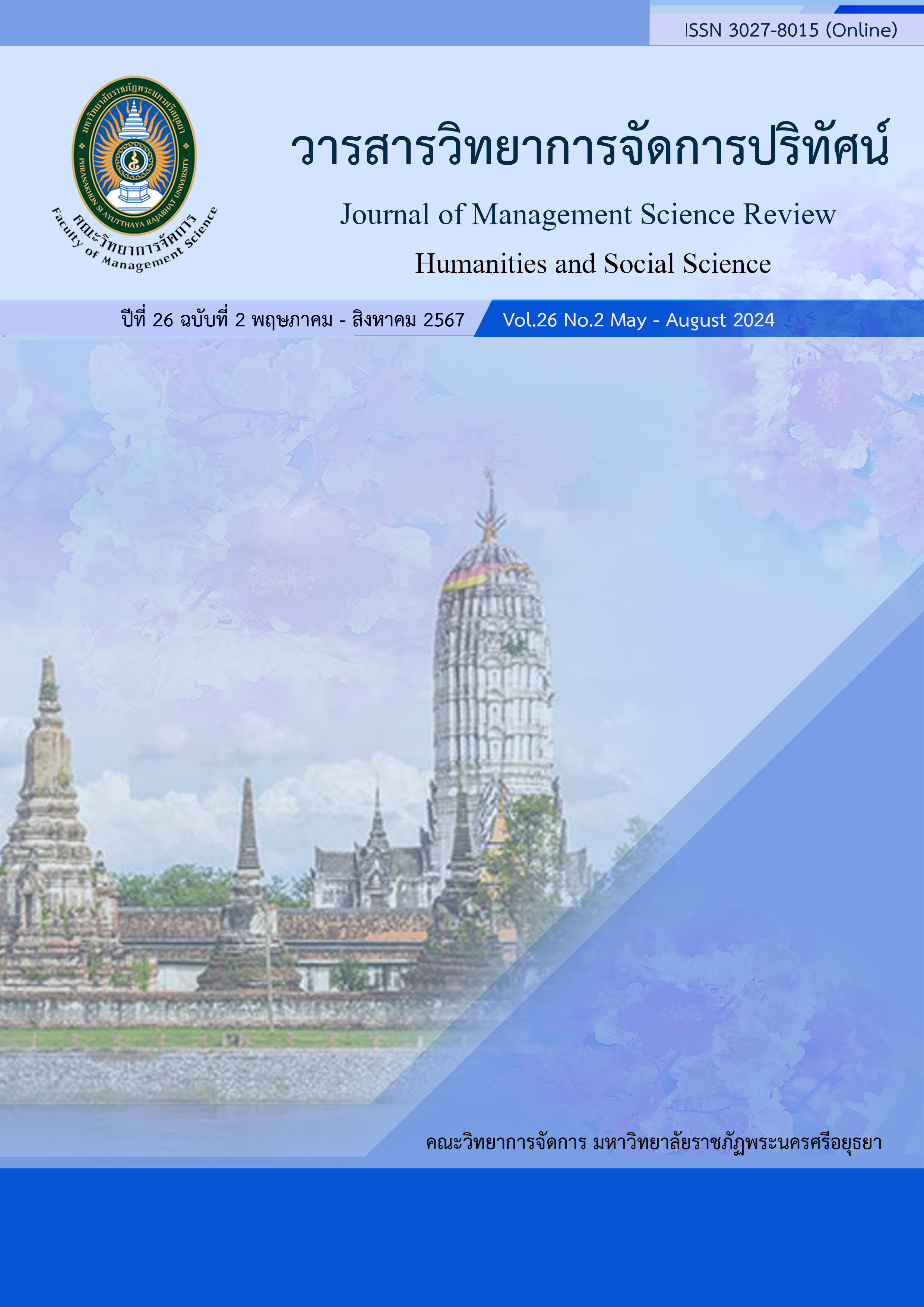การพัฒนารูปแบบการจัดการของกลุ่มผู้ประกอบการผลิตภัณฑ์ชุมชนสู่ความยั่งยืน บ้านต้อน ตำบลทุ่งทอง อำเภอบ้านเขว้า จังหวัดชัยภูมิ
คำสำคัญ:
การพัฒนา, รูปแบบการจัดการ, ผลิตภัณฑ์ชุมชน, กลุ่มผู้ประกอบการ, ความยั่งยืนบทคัดย่อ
การวิจัยนี้มีวัตถุประสงค์ 1)เพื่อศึกษาสภาพการดำเนินงานรูปแบบการจัดการกลุ่มผู้ประกอบการผลิตภัณฑ์ชุมชน 2)เพื่อศึกษาปัญหา อุปสรรค ความต้องการรูปแบบการจัดการของกลุ่มผู้ประกอบการผลิตภัณฑ์ชุมชน และ 3) เพื่อกำหนดแนวทางการพัฒนารูปแบบการจัดการกลุ่มผู้ประกอบการผลิตภัณฑ์ชุมชน สู่ความยั่งยืนบ้านต้อน ตำบลทุ่งทอง อำเภอบ้านเขว้า จังหวัดชัยภูมิ ดำเนินการเก็บข้อมูลเชิงปริมาณจากกลุ่มตัวอย่าง จำนวน 103 คน ที่เป็นสมาชิกกลุ่มผู้ประกอบการผลิตภัณฑ์ชุมชนตำบลบ้านต้อน และเก็บข้อมูลเชิงคุณภาพจากกลุ่มเป้าหมาย ด้วยการสัมภาษณ์ เชิงลึก จำนวน 12 คน สนทนากลุ่มย่อย จำนวน 20 คน สถิติที่ใช้ในงานวิจัย คือ ค่าความถี่ ร้อยละ ค่าเฉลี่ย และส่วนเบี่ยงเบนมาตรฐาน สังเคราะห์ผลการสัมภาษณ์เชิงลึก และการสนทนากลุ่มย่อย เพื่อสรุปองค์ความรู้ที่ได้จากการวิจัย โดยนำเสนอเป็นความเรียง ผลการวิจัยพบว่า สภาพการดำเนินงานรูปแบบการจัดการกลุ่ม ในภาพรวมคะแนนเฉลี่ยโดยรวมอยู่ในระดับ “มาก” สภาพทั่วไปในการดำเนินงานของกลุ่ม โดยส่วนใหญ่มีจุดเริ่มต้นในการจัดตั้งกลุ่มจากแรงบันดาลใจที่เกิดจากการได้รับการสนับสนุนส่งเสริมจากหน่วยงานภาครัฐ โดยเริ่มจากการเข้าร่วมฝึกอบรม และการได้รับสนับสนุนวัสดุอุปกรณ์เพื่อใช้ในการผลิตสินค้า แต่เมื่อผลิตสินค้าแล้วนำไปขายเป็นสินค้าเสริมจากสินค้าหลัก ซึ่งสินค้าหลักคือผ้าไหม จึงทำให้สินค้าเหล่านี้อาจเป็นได้แค่ของสมนาคุณให้กับลูกค้า หรือเป็นของฝากให้กับแขกที่มาเยือน แต่ไม่ก่อให้เกิดรายได้ที่เพิ่มขึ้นจากสินค้าเหล่านี้เท่าที่ควร ซึ่งแนวทางการพัฒนารูปแบบการจัดการกลุ่มผู้ประกอบการเพื่อให้เกิดความยั่งยืน หน่วยงานภาครัฐควรเป็นพี่เลี้ยงในการเสริมทักษะในการพัฒนาการผลิตสินค้า เพิ่มทักษะการบริหารงานของกลุ่มให้มีประสิทธิภาพ
เอกสารอ้างอิง
ธงพล พรหมสาขา ณ สกลนคร และอุทิศ สังขรัตน์ (2557, มกราคม - มิถุนายน). แนวทางการพัฒนาการดำเนินงานของวิสาหกิจชุมชนในเขตลุ่มทะเลสาบสงขลา. วารสารคณะมนุษย์ศาสตร์และสังคมศาสตร์ มหาวิทยาลัยสงขลานครินทร์ วิทยาเขต ปัตตานี, 10(1).
ปณิตา แจ้ดนาลาว และ ธรินี มณีศรี (2563, มกราคม–มีนาคม). รูปแบบการจัดการโซ่อุปทานวิสาหกิจชุมชนกลุ่มสินค้าเกษตรอย่างยั่งยืน. วารสารชุมชนวิจัย, 14(1).
ยรรยงค์ ธัชพลและคณะ (2562). กระบวนการบริหารจัดการวิสาหกิจชุมชนเพื่อการพัฒนาอย่างยั่งยืนกรณีศึกษา : วิสาหกิจชุมชนจังหวัดน่าน. สถาบันวิจัยพุทธศาสตร์ มหาวิทยาลัยมหาจุฬาลงกรณราชวิทยาลัย.
ศูนย์วิจัยและสนับสนุนเป้าหมายการพัฒนาที่ยั่งยืน. (ม.ป.ป). ข้อมูลเบื้องต้นเกี่ยวกับ SDGs. https://www.sdgmove.com/intro-to-sdgs/
สมคิด บางโม. (2562). องค์การและการจัดการ. ซีเอ็ดยูเคชั่น.
สลิลรดา รัตน์พลที (2566, กรกฎาคม–ธันวาคม). การพัฒนารูปแบบการจัดการวิสาหกิจชุมชนเพื่อความยั่งยืน ตำบลซับมะกรูด อำเภอคลอง หาดจังหวัดสระแก้. วารสารมนุษยศาสตร์และสังคมศาสตร์, 12(2),
สำนักงานปลัดกระทรวงพาณิชย์ สำนักนโยบายและยุทธศาสตร์การค้า และกองบริหารพาณิชย์ภูมิภาค (2566). FACTSHEET-จังหวัดชัยภูมิ ประจำเดือนตุลาคม 2566. https://chaiyaphum.moc.go.th/ th/file/get/file/20231123c4b77410808c20ef5b241f5568be9172095136.pdf
Krejcie, R.V. & Morgan, D.W. (1970). Determining Sample Size for Rescarch Activities. Educational and Psychological Measurement, 30(3), 607-610.





